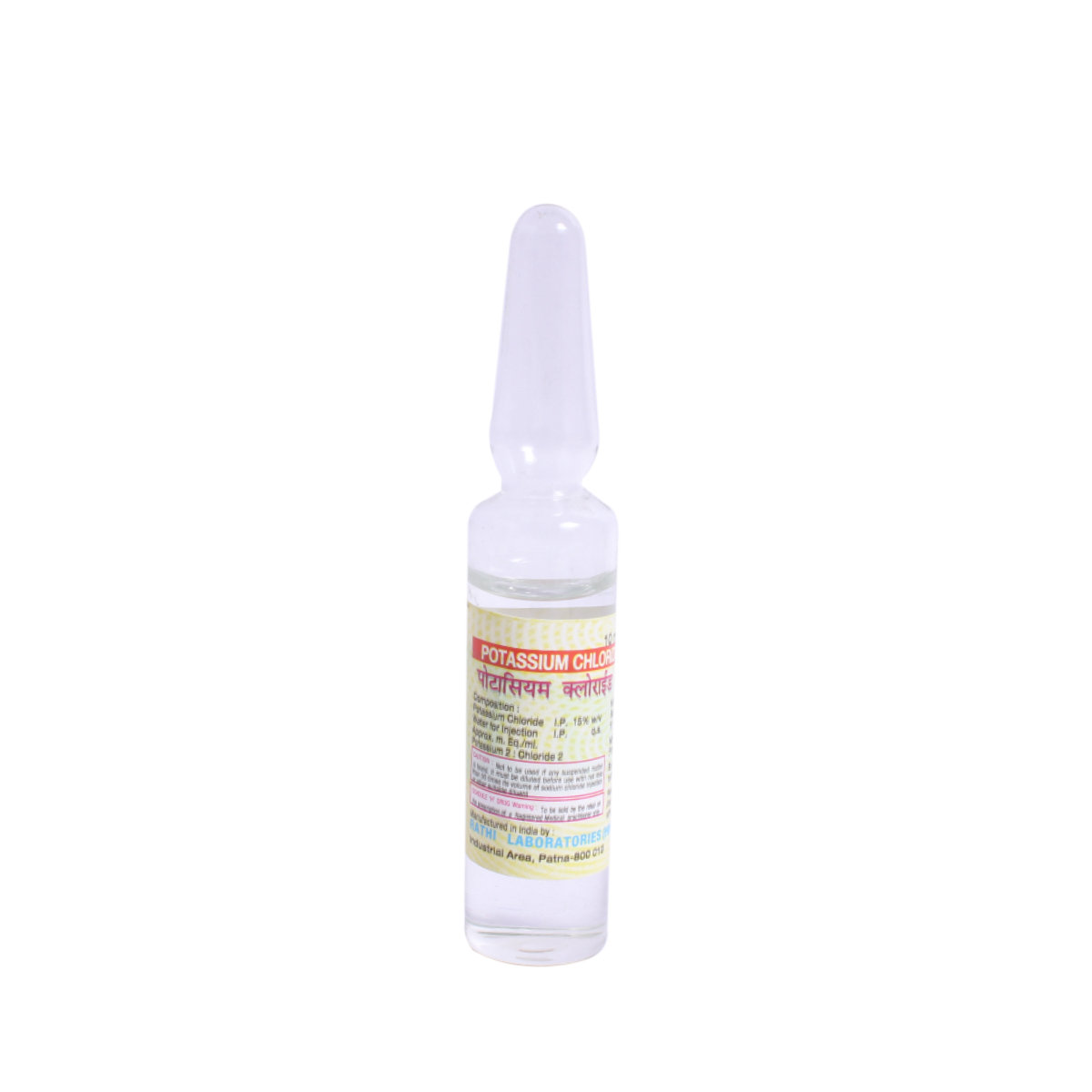Rathi Potassium Chloride Injection 10 ml
MRP ₹23
(Inclusive of all Taxes)
₹3.5 Cashback (15%)
Provide Delivery Location
Online payment accepted
 Prescription drug
Prescription drugWhats That
Composition :
Manufacturer/Marketer :
Consume Type :
Expires on or after :
Return Policy :
About Rathi Potassium Chloride Injection
Rathi Potassium Chloride Injection belongs to the group of medicines called electrolyte replacement solutions indicated in the treatment of potassium deficiency when oral treatment is not feasible or dietary measures are inadequate.
Rathi Potassium Chloride Injection contains ‘Potassium chloride’, which works by replenishing the potassium, thereby treating hypokalaemia/potassium deficiency.
In some cases, Rathi Potassium Chloride Injection may cause side effects such as pain at the site of injection, nausea, muscle weakness, and tingling sensation. Most of these side effects do not require medical attention and will resolve gradually over time. However, you are advised to talk to your doctor if the side effects persist or worsen.
Let your doctor know if you are allergic to Rathi Potassium Chloride Injection. Inform your doctor if you are pregnant or breastfeeding before. Keep your doctor informed about your health condition and medicines to rule out any side effects/interactions.
Uses of Rathi Potassium Chloride Injection
Directions for Use
Key Benefits
Rathi Potassium Chloride Injection belongs to the group of medicines called electrolyte replacement solutions indicated in the treatment of potassium deficiency when oral treatment is not feasible or dietary measures are inadequate. Rathi Potassium Chloride Injection contains ‘Potassium chloride’, which works by replenishing the potassium, thereby treating hypokalaemia/potassium deficiency.
Storage
Drug Warnings
Do not take Rathi Potassium Chloride Injection if you are allergic to any of its components, if you have hyperkalaemia (high potassium levels), impaired kidney function, Addison’s disease (hormonal disorder), if you are very dehydrated, have heat cramps, or hyperchloraemia (electrolyte disturbance in which there is an abnormally elevated level of the chloride ion in the blood). Inform your doctor if you have heart disease or have had a severe injury such as a burn. Consult your doctor if you are pregnant or breastfeeding.
Drug-Drug Interactions
Drug-Drug Interactions
Login/Sign Up
Taking Mepenzolate and Rathi Potassium Chloride Injection 10 ml(in tablet or capsule form) together can increase the risk of stomach ulcers, bleeding, and other gastrointestinal injury.
How to manage the interaction:
Taking Mepenzolate with Rathi Potassium Chloride Injection 10 ml is not recommended, as it can lead to an interaction, it can be taken if a doctor has prescribed it. However, if you experience severe stomach pain, bloating, sudden lightheadedness or dizziness, nausea, vomiting (especially with blood), decreased hunger, dark, tarry stools, consult the doctor immediately.
Taking Cyproheptadine with Rathi Potassium Chloride Injection 10 ml can increase the risk of stomach ulcers.
How to manage the interaction:
Taking Cyproheptadine with Rathi Potassium Chloride Injection 10 ml is not recommended, as it can lead to an interaction, can be taken if your doctor has prescribed it. However, if you experience severe stomach pain, bloating, sudden lightheadedness or dizziness, nausea, vomiting (especially with blood), decreased hunger, dark, tarry stools, consult the doctor immediately. Do not stop any medication without talking to a doctor.
Taking Difenoxin and Rathi Potassium Chloride Injection 10 ml (in tablet or capsule form) together can increase the risk of stomach ulcers, bleeding, and other gastrointestinal injury.
How to manage the interaction:
Taking Difenoxin with Rathi Potassium Chloride Injection 10 ml is not recommended, as it can lead to an interaction, it can be taken if a doctor has prescribed it. However, if you experience severe stomach pain, bloating, sudden lightheadedness or dizziness, nausea, vomiting (especially with blood), decreased hunger, dark, tarry stools, consult the doctor immediately.
Taking Procyclidine and Rathi Potassium Chloride Injection 10 ml together can increase the risk of stomach ulcers.
How to manage the interaction:
Taking Procyclidine with Rathi Potassium Chloride Injection 10 ml is not recommended, but it can be taken together if advised by a doctor. However, if you experience severe stomach pain, bloating, sudden lightheadedness or dizziness, nausea, vomiting (especially with blood), decreased hunger, or dark, tarry stools, consult the doctor immediately. Do not discontinue any medications without a doctor's advice.
Taking Doxepin with Rathi Potassium Chloride Injection 10 ml can increase the risk of stomach ulcers.
How to manage the interaction:
Taking Doxepin with Rathi Potassium Chloride Injection 10 ml is not recommended, as it can lead to an interaction, but it can be taken if a doctor has prescribed it. However, if you experience severe stomach pain, bloating, sudden lightheadedness or dizziness, nausea, vomiting (especially with blood), loss of appetite, or dark, tarry stools, consult the doctor immediately. Do not discontinue any medications without a doctor's advice.
Taking Tolterodine and Rathi Potassium Chloride Injection 10 ml together can increase the risk of side effects.
How to manage the interaction:
Although there is an interaction between Tolterodine and Rathi Potassium Chloride Injection 10 ml, they can be taken if prescribed by a doctor. However, contact a doctor immediately if you develop severe abdominal pain, bloating, sudden dizziness or lightheadedness, nausea, vomiting (especially with blood), or less desire to eat. Do not discontinue medications without consulting a doctor.
Co-administration of Flavoxate with Rathi Potassium Chloride Injection 10 ml can increase the risk of stomach ulcers.
How to manage the interaction:
Taking Flavoxate with Rathi Potassium Chloride Injection 10 ml is not recommended, as it can lead to an interaction, it can be taken if a doctor has prescribed it. However, if you experience severe stomach pain, bloating, sudden lightheadedness or dizziness, nausea, vomiting (especially with blood), decreased hunger, or dark, tarry stools, consult the doctor immediately. Do not discontinue the medication without consulting a doctor.
Co-administration of Dimenhydrinate and Rathi Potassium Chloride Injection 10 ml can increase the risk of stomach inflammation.
How to manage the interaction:
Co-administration of Dimenhydrinate with Rathi Potassium Chloride Injection 10 ml is generally not recommended, as it can lead to an interaction, it can be taken when a doctor has prescribed it. However, if you experience severe stomach pain, sudden dizziness, vomiting (especially with blood), or dark stools, consult the doctor immediately. Do not discontinue any medications without a doctor's advice.
The combination of Amitriptyline and Rathi Potassium Chloride Injection 10 ml may cause stomach and upper intestinal discomfort. (Only applicable to an oral preparation)
How to manage the interaction:
Although co-administration of Amitriptyline and Rathi Potassium Chloride Injection 10 ml is not recommended as it can possibly lead to an interaction, they can be taken if prescribed by a doctor. If you experience severe stomach pain, bloating, sudden dizziness or lightheadedness, nausea, vomiting (in particular with blood), decreased hunger, and black stools while taking these medications, consult a doctor immediately. Do not discontinue any medications without talking to a doctor.
Taking Rathi Potassium Chloride Injection 10 ml with clidinium bromide may increase the risk of irritant effects of potassium on your stomach and upper intestine.
How to manage the interaction:
Co-administration of Rathi Potassium Chloride Injection 10 ml with clidinium bromide is not recommended, it can be taken if prescribed by the doctor. However, if you experience symptoms such as severe stomach pain, bloating, sudden dizziness or lightheadedness, nausea, vomiting (especially with blood), decreased hunger, black, tarry stools, consult the doctor immediately. Do not discontinue any medications without consulting a doctor.
Drug-Food Interactions
Drug-Food Interactions
Login/Sign Up
Diet & Lifestyle Advise
- Follow a well-balanced diet.
- Exercising regularly helps in improving overall health.
- Rest well, and get plenty of sleep.
- Avoid smoking and alcohol consumption.
- Try meditation or yoga, as they can help lower stress.
- Avoid processed and fried food.
Side Effects of Rathi Potassium Chloride Injection
- Pain at the site of injection
- Nausea
- Muscle weakness
- Tingling sensation
Habit Forming
Therapeutic Class
All Substitutes & Brand Comparisons
RX
Out of StockVLPL Potassium Chloride Injection 10 ml
V L Pharma
₹26.5
(₹2.39/ 1ml)
15% COSTLIER
Author Details
We provide you with authentic, trustworthy and relevant information
Drug-Diseases Interactions
Drug-Diseases Interactions
Login/Sign Up
FAQs
Drug-Drug Interactions Checker List
- AMILORIDE
- SPIRONOLACTONE
- TRIAMTERENE
- ALISKIREN
- CICLOSPORIN
- TACROLIMUS
Special Advise
- Continuous monitoring of Electrocardiogram (ECG) is advised.
- Urine flow, serum electrolyte levels, and acid-base status should be monitored.
Disease/Condition Glossary
Hypokalaemia (low potassium): It is a condition in which the serum concentration of potassium is below normal. Inadequate dietary intake of potassium, chronic kidney disease, use of medication (such as diuretics or antibiotics), and loss of gastrointestinal fluids through diarrhoea, vomiting or laxative use could be the causes of hypokalaemia. Symptoms include weakness, muscle pain, constipation, palpitations, or numbness.

Have a query?
Alcohol
Safe if prescribed
It is unknown if alcohol affects Rathi Potassium Chloride Injection. Please consult your doctor.
Pregnancy
Consult your doctor
If you are pregnant or planning pregnancy, inform your doctor before receiving Rathi Potassium Chloride Injection. Your doctor may prescribe this medicine if the benefits outweigh the risks.
Breast Feeding
Consult your doctor
If you are breastfeeding, inform your doctor before receiving Rathi Potassium Chloride Injection. Your doctor may prescribe this medicine if the benefits outweigh the risks.
Driving
Safe if prescribed
Rathi Potassium Chloride Injection is unlikely to affect your ability to drive.
Liver
Consult your doctor
If you have a pre-existing or a history of liver disease, inform your doctor before receiving Rathi Potassium Chloride Injection. Your doctor may adjust the dose of this medicine or prescribe a suitable alternative based on your condition.
Kidney
Consult your doctor
You should not be given Rathi Potassium Chloride Injection if you have impaired kidney function. If you have kidney problems, inform your doctor before receiving Rathi Potassium Chloride Injection.
Children
Safe if prescribed
The safety and efficacy of Rathi Potassium Chloride Injection in children have not been fully established. Please consult your doctor.







_0.jpg?tr=q-85)

